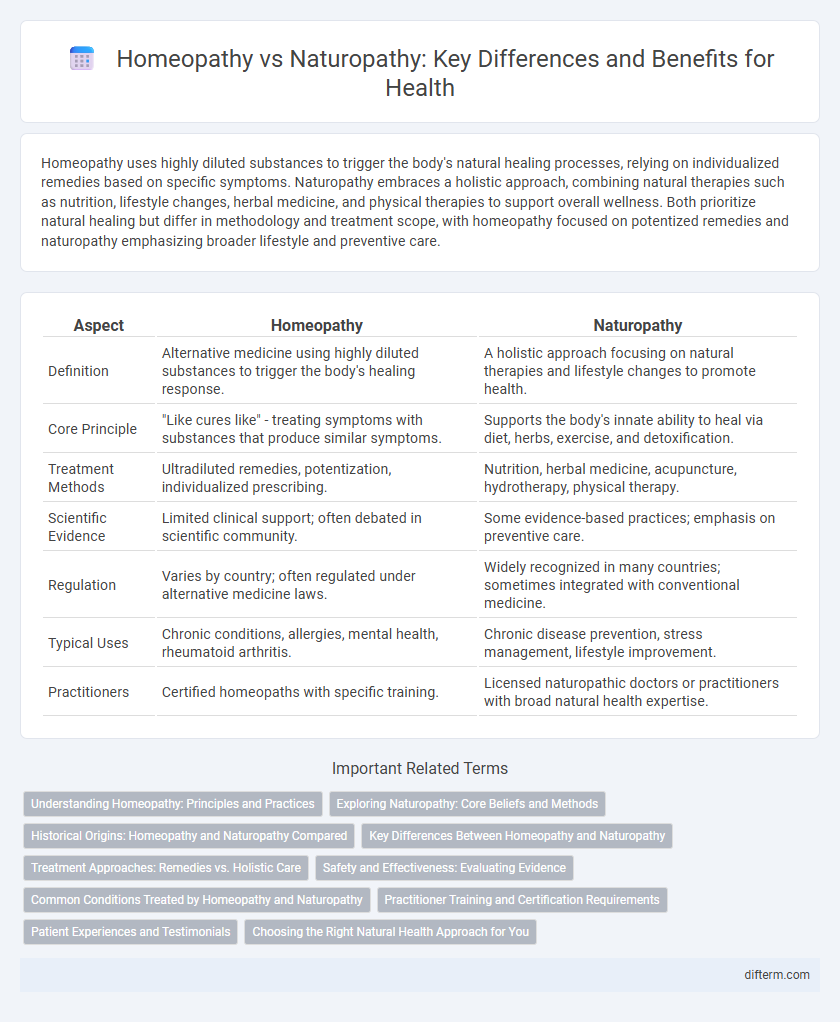Homeopathy uses highly diluted substances to trigger the body's natural healing processes, relying on individualized remedies based on specific symptoms. Naturopathy embraces a holistic approach, combining natural therapies such as nutrition, lifestyle changes, herbal medicine, and physical therapies to support overall wellness. Both prioritize natural healing but differ in methodology and treatment scope, with homeopathy focused on potentized remedies and naturopathy emphasizing broader lifestyle and preventive care.
Table of Comparison
| Aspect | Homeopathy | Naturopathy |
|---|---|---|
| Definition | Alternative medicine using highly diluted substances to trigger the body's healing response. | A holistic approach focusing on natural therapies and lifestyle changes to promote health. |
| Core Principle | "Like cures like" - treating symptoms with substances that produce similar symptoms. | Supports the body's innate ability to heal via diet, herbs, exercise, and detoxification. |
| Treatment Methods | Ultradiluted remedies, potentization, individualized prescribing. | Nutrition, herbal medicine, acupuncture, hydrotherapy, physical therapy. |
| Scientific Evidence | Limited clinical support; often debated in scientific community. | Some evidence-based practices; emphasis on preventive care. |
| Regulation | Varies by country; often regulated under alternative medicine laws. | Widely recognized in many countries; sometimes integrated with conventional medicine. |
| Typical Uses | Chronic conditions, allergies, mental health, rheumatoid arthritis. | Chronic disease prevention, stress management, lifestyle improvement. |
| Practitioners | Certified homeopaths with specific training. | Licensed naturopathic doctors or practitioners with broad natural health expertise. |
Understanding Homeopathy: Principles and Practices
Homeopathy is a therapeutic system based on the principle of "like cures like," where highly diluted substances aim to trigger the body's self-healing response. Remedies are prepared through serial dilution and succussion, ensuring minimal toxicity while stimulating vital energy. Practitioners tailor treatments to individual symptoms, emphasizing holistic care and constitutional evaluation.
Exploring Naturopathy: Core Beliefs and Methods
Naturopathy emphasizes holistic healing by stimulating the body's innate ability to recover through natural therapies such as herbal medicine, acupuncture, and nutrition. This approach integrates lifestyle counseling, physical therapies, and detoxification techniques to support overall well-being and prevent illness. Unlike homeopathy's use of highly diluted substances, naturopathy focuses on real, measurable treatments aimed at restoring balance and promoting long-term health.
Historical Origins: Homeopathy and Naturopathy Compared
Homeopathy emerged in the late 18th century, founded by Samuel Hahnemann, based on the principle of "like cures like" and the use of highly diluted substances to stimulate the body's self-healing. Naturopathy developed in the late 19th and early 20th centuries, integrating various natural healing traditions such as herbal medicine, nutrition, and hydrotherapy, emphasizing the body's innate ability to heal without pharmaceuticals. Both practices share roots in holistic health but differ significantly in methodology and historical development.
Key Differences Between Homeopathy and Naturopathy
Homeopathy uses highly diluted substances to stimulate the body's self-healing, based on the principle of "like cures like," whereas naturopathy employs a broader approach including herbal medicine, nutrition, and physical therapies to support overall wellness. Homeopathy relies primarily on individualized remedies tailored to specific symptoms, while naturopathy addresses multiple aspects of health by combining various natural treatments and lifestyle modifications. The scope of naturopathy is wider, integrating prevention and holistic care, whereas homeopathy is more focused on symptom-based treatment.
Treatment Approaches: Remedies vs. Holistic Care
Homeopathy centers on individualized remedies using highly diluted substances to trigger the body's self-healing, focusing on symptom-specific treatment. Naturopathy employs a holistic care approach that integrates nutrition, lifestyle changes, herbal medicine, and physical therapies to promote overall wellness and prevent disease. The distinction lies in homeopathy's targeted remedy formulations compared to naturopathy's comprehensive health strategies addressing the root causes of illness.
Safety and Effectiveness: Evaluating Evidence
Homeopathy and naturopathy both emphasize natural healing methods, but evidence on their safety and effectiveness varies significantly. Rigorous studies often show limited clinical efficacy for homeopathy beyond placebo effects, while naturopathy incorporates a broader range of therapies with mixed scientific support, some demonstrating moderate benefits. Evaluating patient outcomes and adverse event reports is crucial for determining appropriate integrative health approaches.
Common Conditions Treated by Homeopathy and Naturopathy
Homeopathy commonly treats chronic conditions like allergies, asthma, migraines, and digestive disorders using highly diluted natural substances tailored to individual symptoms. Naturopathy addresses a broader range of health issues including hormonal imbalances, stress-related disorders, hypertension, and autoimmune diseases through holistic therapies such as herbal medicine, nutrition, and lifestyle counseling. Both approaches prioritize natural healing but differ in diagnostic methods and treatment scope.
Practitioner Training and Certification Requirements
Homeopathy practitioners typically complete specialized training programs accredited by organizations such as the Council for Homeopathic Certification, which require extensive coursework and supervised clinical practice. Naturopathy practitioners undergo broader education at accredited naturopathic medical schools, including comprehensive studies in natural therapies, diagnostics, and clinical medicine, often culminating in a Doctor of Naturopathic Medicine (ND) degree and licensure depending on the region. Certification requirements for both fields vary by country and state, with naturopaths generally facing more stringent regulatory standards and standardized examinations compared to homeopaths.
Patient Experiences and Testimonials
Patient experiences with homeopathy often highlight gradual symptom relief and personalized treatment plans targeting specific ailments. Testimonials from naturopathy users emphasize holistic wellness improvements, including lifestyle changes and natural therapies that support overall health balance. Both practices receive praise for their non-invasive approaches and patient-centered care, fostering trust and satisfaction among users seeking alternative medical options.
Choosing the Right Natural Health Approach for You
Homeopathy utilizes highly diluted substances to stimulate the body's self-healing while naturopathy combines diverse natural therapies such as herbal medicine, nutrition, and lifestyle counseling to promote overall wellness. Selecting the right natural health approach depends on individual health goals, specific conditions, and personal preferences for treatment intensity and duration. Consulting a qualified practitioner ensures tailored care that aligns with your unique health needs and maximizes therapeutic effectiveness.
homeopathy vs naturopathy Infographic

 difterm.com
difterm.com